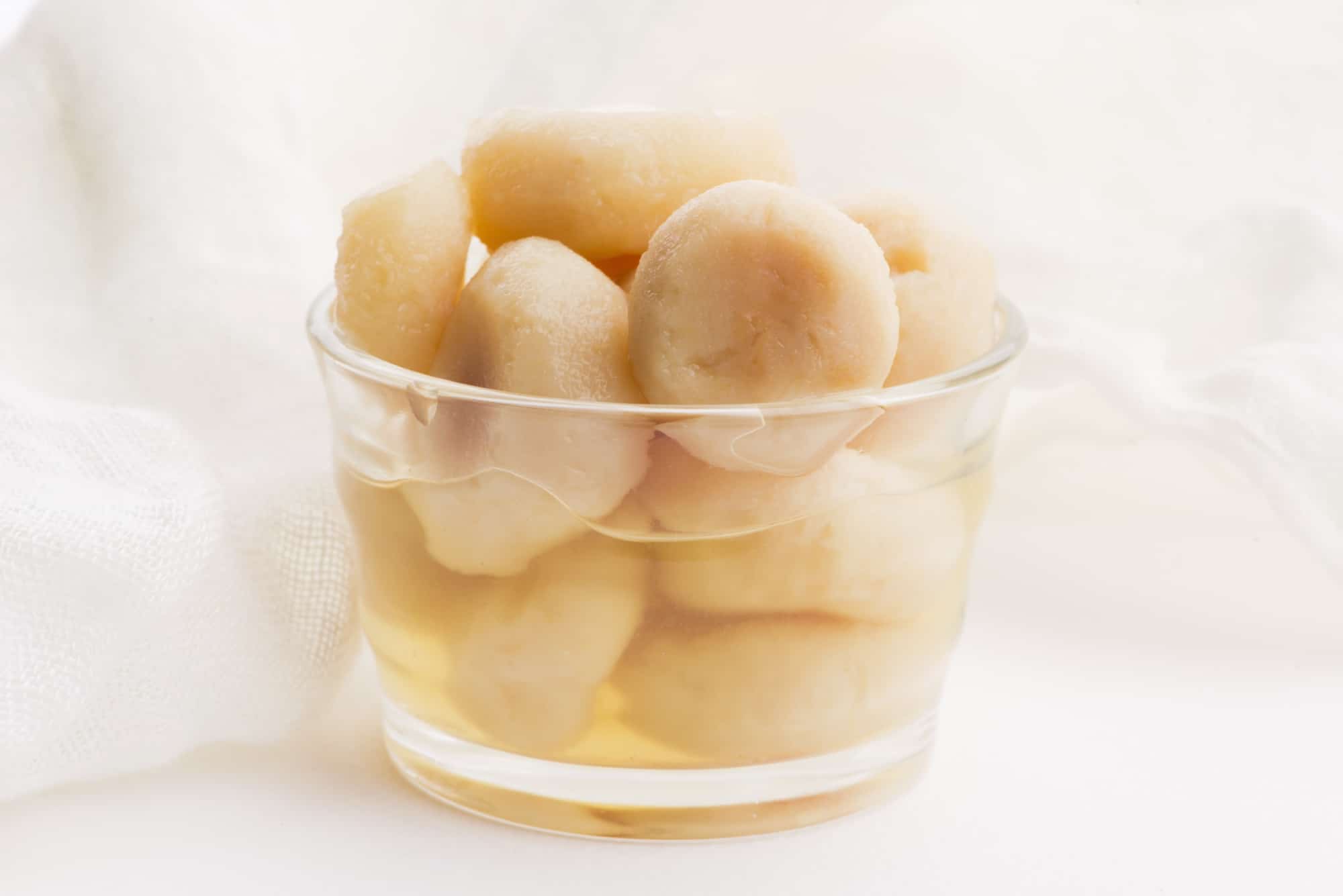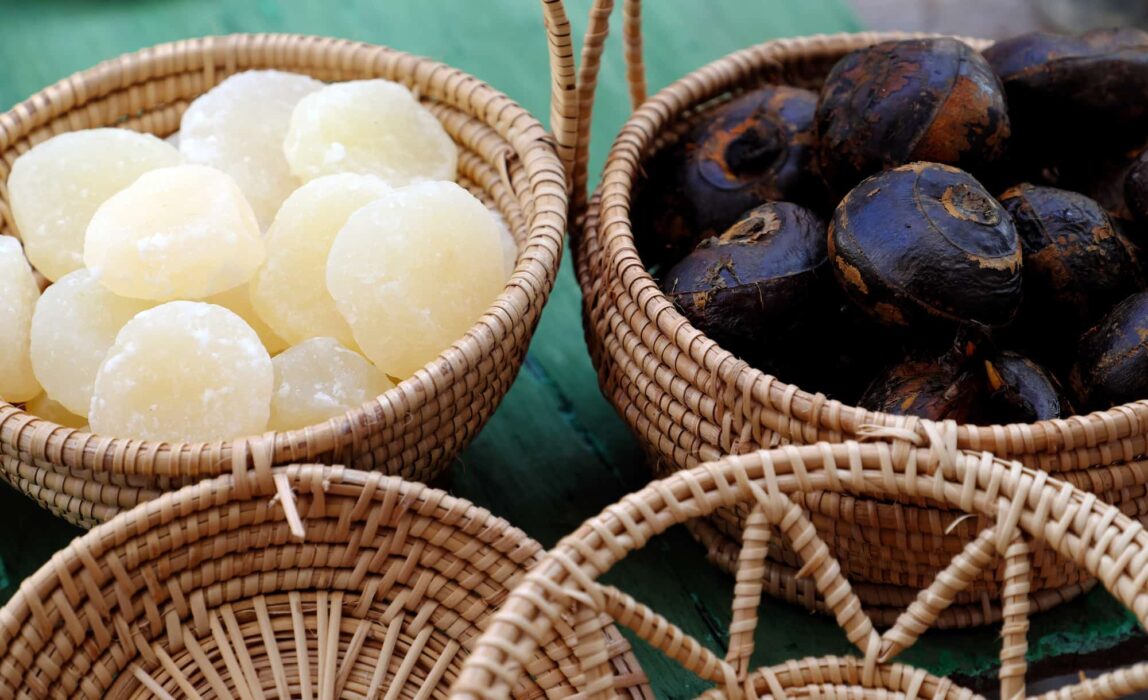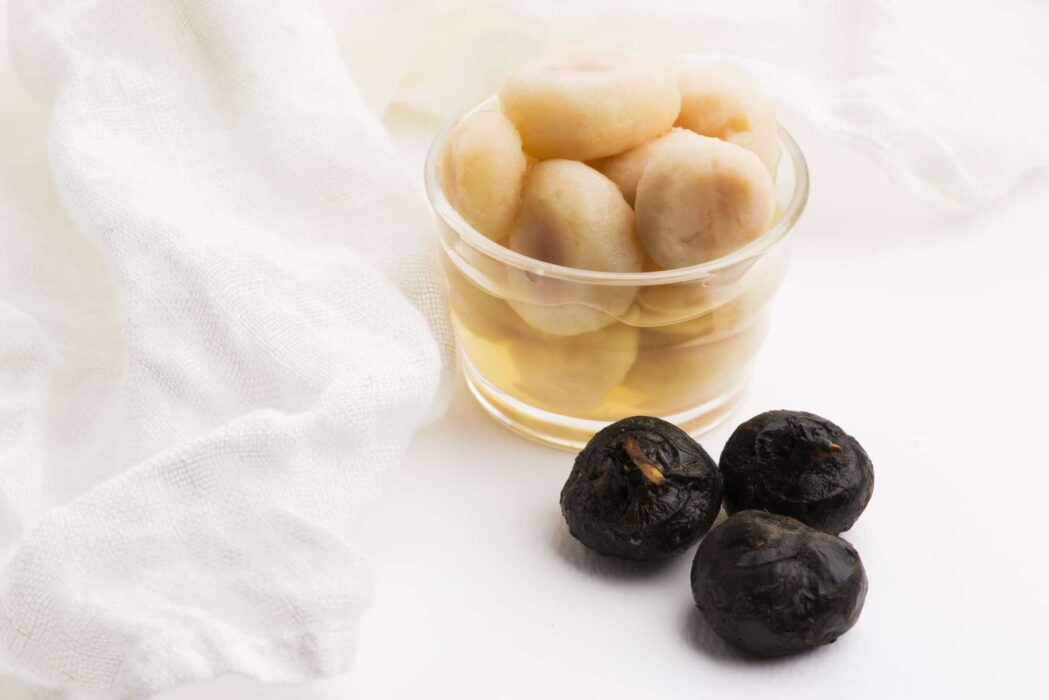Water chestnuts are a delightful part of Chinese cuisine. You’ve probably tried them in various forms – as a side dish or addition to fries, as part of delicious pancakes or salads. And now you’re wondering if water chestnuts are right for your keto diet? How many carbohydrates do they contain, and do they have any beneficial nutritional properties?
The short answer is no. Water chestnuts are not keto. Although they are very watery and low in calories, they are high in complex carbohydrates and are among the starchy foods prohibited on the keto diet. Despite the high amount of fiber that is good for digestion, water chestnuts raise blood sugar, contrary to the concept of a ketogenic diet.

And yet, exactly how many carbohydrates do water chestnuts contain? How much fiber, fat, and protein? What benefits can you use for your health? Let’s take a closer look at all of these issues. Let’s dive in!
What Are Water Chestnuts?
The water chestnut is a sedge herb cultivated for the edibility of its corms. It is planted in rice paddies, where the regular high humidity of the marshy areas creates ideal conditions for the ripening of bulbs, which require over 220 days of warmth.
The corms of the plant are tubers that visually resemble chestnuts, small and round. Under the brown shell, there is a crunchy white pulp. This pulp tastes like a young radish of extra sweetness. Water chestnut is a source of invaluable benefits for the human body and an irreplaceable assistant in a healthy life.
Widely known in China, water chestnut is an ingredient in a wide variety of recipes and dishes. So, it is eaten raw, boiled, fried, or canned. Mashed water chestnut is used in China as a minced meat ingredient for a kind of dumplings.
In addition, water chestnuts are ground into flour for making special sweets, desserts, and cakes. The plant’s tubers go well with noodles and rice, cilantro, ginger, bamboo shoots, young peas, and sesame oil. The advantages of the plant include the fact that pickling, heat treatment, and other actions do not in any way affect the quality of water chestnuts, and do not deprive them of their rich, crunchy taste.
Are Water Chestnuts Keto?
So, are there carbs in water chestnuts? Its tubers contain a lot of water and carbohydrates in the amount of about 90% of the dry volume, especially starch (about 60%), and, in addition, in large doses, they contain dietary fiber, copper, manganese, riboflavin, vitamin B6 and other vitamins and elements. Since time immemorial, the Chinese have included water chestnut tubers in their diet and are actively cultivating the plant in several suitable provinces of the country.
Keto-Friendly Nuts: What to Eat and What to Avoid
So, 100 grams of water chestnut contains 224 calories and the following macronutrients:
- Total fat content 1.11g
- Saturated 0.16 g
- Polyunsaturated 0.29 g
- Monounsaturated 0.58 g
- Cholesterol 0mg
- Total carbohydrate content 49.07 g
- Dietary fiber 5 g
- Sugar 1.6 g
- Proteins 4.2 g
As you can see, this amount of carbs is critical for a low-carb diet. What’s more, most of these carbs come from starch, raising blood sugar levels significantly. Therefore, water chestnuts are not suitable for a state of ketosis, so you should avoid them.
However, if you are on a mild version of a low-carb diet that includes up to 50-80 grams of healthy carbs per day, you can sometimes afford a small serving of water chestnuts. They can provide you with many health benefits even when consumed once a week.

Health Benefits of Water Chestnuts
So let’s take a look at the main vitamins and elements in water chestnuts and their beneficial effects on your health. The main ingredients of water chestnuts are as follows (per 100 grams):
- Vitamin A – 10 μg
- Calcium 18 μg
- Vitamin B6 – 0.41 mg
- Iron 1.41 mg
- Vitamin C – 36 mg
- Zinc 0.87 mg
- Magnesium 84 mg
- Potassium 447 mg
- Sodium 3 mg
Vitamin A
Water chestnuts contain Vitamin A or retinol. This is one of the vitamins vital and necessary for our body, belonging to the group of fat-soluble vitamins. The health benefits of vitamin A are invaluable: it takes part in oxidative and health-improving processes, and affects protein synthesis and cell membranes. Retinol is essential for the formation of the skeletal system and teeth, for new cell growth, slowing down the aging process.
Retinol has a beneficial effect on vision: it is very important for photoreception, and it is necessary for the synthesis of visual pigment in the retina. The normal functioning of the immune system largely depends on vitamin A:
- An increase in the barrier function of the mucous membranes.
- An increase in the phagocytic activity of leukocytes.
- Other nonspecific factors affecting immunity.
Vitamin A protects us against flu, colds, and respiratory tract infections and prevents infections of the digestive tract and urinary tract. Although you cannot eat water chestnuts on keto, there are many keto sources of vitamin A – for example, olives.
Vitamin B6
It contributes to the proper assimilation of protein and fat and turns tryptophan, an essential amino acid, into niacin. It helps prevent various nervous and skin disorders, relieves nausea, and promotes the correct synthesis of anti-aging nucleic acids. Vitamin B6 reduces muscle cramps at night and decreases hand numbness and certain forms of limb neuritis. It also acts as a natural diuretic.
People who consume large amounts of protein especially need this vitamin. Vitamin B6 can reduce the insulin requirement of diabetics, and if the dose is not adjusted, it can lead to a drop in blood sugar.
Vitamin C
In the human body, vitamin C acts as a regulator of many biochemical reactions. For example, it takes part in the synthesis of collagen – the main structural protein of connective tissue. It ensures the functionality and stability of blood vessels, bones, and tendons. Vitamin C has a significant effect on the absorption and metabolism of other micronutrients and vitamins.
Keto Diet: All the Healthy Keto Tips for Women over 50
As a powerful antioxidant, it provides direct protection for proteins, fats, DNA, and RNA from the harmful effects of free radicals, which are often formed in cells during life. In addition, vitamin C supports another important antioxidant, glutathione, which reduces the damaging effects of toxins and heavy metals at the biochemical level.

Calcium
The health and strength of our bones and joints depend on a healthy, nutritious diet and a constant supply of nutrients. And one of them is calcium, which water chestnuts contain in large quantities.
Calcium is a trace element (mineral) that is important for strengthening and maintaining strong bones, joints, and dental health. It is also very important for other functions in your body, such as muscle control and proper blood circulation. Your body does not produce calcium on its own, so it must be absorbed from your diet.
Iron
A large amount of iron in water chestnuts ensures the healthy functioning of the entire body. One of the main purposes of iron is to transport oxygen to tissues. It is part of hemoglobin, the protein that makes up red blood cells (erythrocytes). It is iron responsible for capturing oxygen, helping red blood cells carry it to all organs and systems of the body. These same blood cells (and again with iron) pick up the waste carbon dioxide and transport it to the lungs for disposal. Without iron, respiratory processes at the cellular level would be simply impossible.
Iron in the human body is an integral part of many enzymes and proteins necessary for metabolic processes – the destruction and utilization of toxins, cholesterol metabolism, and the conversion of calories into energy. It also helps the body’s immune system deal with aggressors.
Zinc
Water chestnuts contain a large amount of zinc. It is a component of more than 300 enzymes involved in energy metabolism, synthesis of proteins, nucleic acids, growth and differentiation of cells (especially immune tissue), and the formation of the extracellular matrix (collagen).
Simply put, zinc is needed to produce proteins and DNA for muscle growth and repair. It is important for the correct sense of taste and smell, promotes wound healing, helps the immune system fight bacteria and viruses, improves digestion, and regulates hormone production.
If you need more zinc but are avoiding water chestnuts, try to add more cabbage to your keto diet.
Magnesium
Magnesium, which is abundant in water chestnuts, has a beneficial effect on bone growth. It normalizes heart rate, lowers blood pressure, regulates blood sugar, relieves muscle cramps, and reduces joint pain.
Magnesium, combined with calcium, also contained in water chestnuts, can increase bone mineral density. After all, it is because of the lack of magnesium in the body that osteoporosis develops. By normalizing the amount of magnesium in the body, you can get rid of insomnia, stress, and depression. Magnesium fights fatigue, prevents headaches, promotes dental health, and prevents kidney stones from accumulating.
Potassium
Water chestnuts are high in potassium. Potassium, together with sodium, regulates the water balance in the body and normalizes the heart rhythm, maintains concentration and physiological functions.
Potassium is involved in the process of conducting nerve impulses and transmitting them to innervated organs. It promotes better brain activity by improving oxygen supply and has a positive effect on many allergic conditions. Potassium is essential for the implementation of skeletal muscle contractions. It regulates the content of salts, alkalis, and acids in the body, which helps to reduce edema.

Sodium
Sodium is a very useful component of any person’s diet. It is needed for normal water exchange between blood cells and tissues, maintaining the acid-base balance in the body, transmitting nerve impulses, and ensuring muscle contraction.
Modern people consume a lot of processed sodium with table salt, which sometimes leads to kidney problems and causes high blood pressure. It is best to obtain sodium from natural foods such as water chestnuts while reducing salt intake in cooking to maintain overall health.
Is Jicama Keto? Carbs, Calories and Health Benefits
Conclusion
Summing up, I can conclude that water chestnuts are not suitable for a keto diet due to their high content of carbohydrates and starch. Even a small serving of water chestnuts will raise your blood sugar and break your ketosis.
You can eat small servings of water chestnuts if you are on a mild low-carb diet with a daily carbohydrate restriction of 50-80 grams per day. In this case, even one serving of water chestnuts will provide you with the necessary vitamins and elements to maintain overall health.